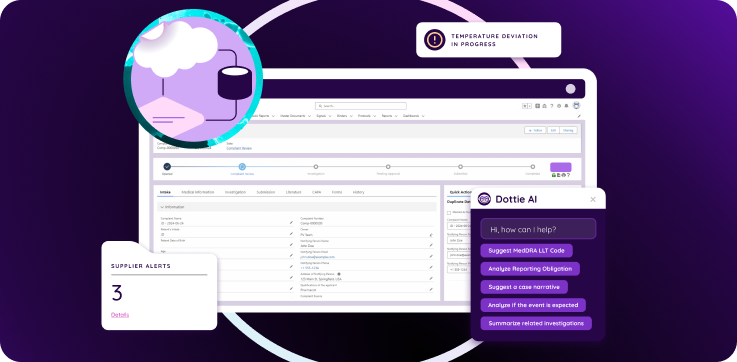What Is an eQMS and Why It’s Critical in Life Sciences

An electronic Quality Management System (eQMS) is a software platform designed to digitally manage quality processes, documents, and compliance activities. Instead of relying on paper records or disconnected spreadsheets, an eQMS centralizes critical operations, providing better visibility, traceability, and control.
In life sciences, the need for strong quality management goes beyond operational efficiency. It is essential for regulatory compliance, product safety, and company growth. An eQMS helps life sciences organizations meet evolving regulatory demands, scale operations across sites, and maintain consistent product quality.
Why an eQMS Matters in Regulated Industries
Compliance requirements for pharmaceuticals, medical devices, and biotechnology are among the most stringent in any industry. Regulations like FDA 21 CFR Part 11, EU Annex 11, ISO 13485, and ICH Q10 all mandate strict control over quality processes, documentation, and electronic records.
Manual or fragmented systems make it difficult to meet these standards. Without a unified platform, companies face increased risks of human error, data loss, incomplete training records, and gaps in audit trails. These vulnerabilities can lead to costly inspection findings, product recalls, or delays in approvals.
An eQMS directly addresses these risks by standardizing processes, ensuring complete traceability, and maintaining real-time audit readiness. It also improves operational efficiency by automating workflows, linking related quality events, and supporting faster, data-driven decision-making.
Core Quality Modules in an eQMS
The eQMS brings together several core modules that cover the key aspects of a compliant and efficient quality system:
Document Management
Effective document management ensures that policies, SOPs, and records are controlled, accessible, and up to date. Key capabilities include version control, audit trails for all document actions, and role-based access to sensitive information.
Training Management
Training management links employee training to the most current SOPs and requirements. Systems assign training based on roles, track completion status, and generate evidence needed during inspections. Automated reminders and dashboards help close compliance gaps.
Deviation and Nonconformance Management
Deviations and nonconformances must be logged, investigated, and resolved according to regulatory expectations. An eQMS provides standardized investigation templates, tracks root cause analysis, and manages escalation pathways to ensure timely closure.
CAPA
Corrective and preventive action (CAPA) processes are critical for addressing underlying issues and preventing recurrence. An eQMS automates CAPA workflows, verifies effectiveness through follow-up checks, and connects CAPAs with related deviations, complaints, and audits.
Change Control
Changes to processes, systems, and products must be assessed for risk and impact before implementation. An eQMS routes change requests through review and approval workflows, links them to updated training and validation activities, and maintains full traceability.
Complaint Management
Complaint management modules capture customer complaints, categorize them based on risk, and route them for investigation. Integration with CAPA and risk management systems ensures that complaint trends are identified early and addressed systematically.
The Role of AI in eQMS
As digital complexity increases, artificial intelligence (AI) is now a critical enhancement to modern eQMS platforms.
AI enables automated classification of quality events, identification of trends across deviations and complaints, and early risk detection based on historical patterns. AI-powered tools can assist with audit preparation, flagging gaps or anomalies before an inspection occurs.
However, introducing AI into quality management brings new compliance challenges. Organizations must validate AI outputs, ensure transparency, and meet regulatory standards like the EU AI Act, ISO 42001, and evolving FDA guidance on AI and machine learning systems.
AI governance within an eQMS must balance innovation with risk management. Life sciences companies need to implement policies that ensure AI models are tested, explainable, and aligned with regulatory expectations throughout their lifecycle.
Get Ready for What’s Next
An eQMS provides the infrastructure needed to maintain compliance, improve operational performance, and support company growth.
As the industry continues to evolve, companies that invest in integrated, intelligent quality systems will be better prepared to adapt to regulatory changes, embrace AI responsibly, and maintain trust with regulators and patients alike.
A future-ready eQMS is not just digital. It is secure, scalable, compliant and essential.We can guide you through how to choose the right eQMS for your business. Download the free white paper to learn more.



